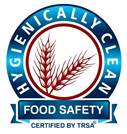
ALEXANDRIA, Va.– With seven more laundries certified this month, UniFirst Corp. has widened its lead among multi-location uniform service companies in achieving the Hygienically Clean Food Safety designation, as 30 facilities now have reached this milestone. The July additions included the company’s first such achievements in Nevada, New York and Wisconsin after UniFirst plants were already certified in 16 states and the Canadian province of British Columbia.
This achievement reflects UniFirst’s commitment to best management practices (BMPs) in laundering as verified by third-party on-site inspection and their capability to produce hygienically clean textiles as quantified by ongoing microbial testing.
The certification confirms a laundry’s dedication to compliance and processing garments and other textile products using BMPs as described in its quality assurance documentation, the focal point for TRSA inspectors’ evaluation of critical control points that minimize risk.
This process eliminates subjectivity by focusing on outcomes and results that verify textiles cleaned in these facilities meet appropriate hygienically clean standards and BMPs for servicing animal processing, dairies, fruit/vegetable, bakeries, grain and other food and beverage industry segments.
UniFirst facilities certified in July are in Ontario, CA; Las Vegas, NV; Buffalo, NY; Amarillo, Austin and Houston, TX; and Wisconsin Rapids, WI. States with previously Hygienically Clean Food Safety certified UniFirst laundries (one each except where noted) are CA (2) CO, CT, FL (2), GA, MA, MD, NC (4), NH (2), NJ, OK, PA, SC, TX (5), UT and VA.
The Hygienically Clean Food Safety protocol examines a laundry’s Hazard Analysis and Critical Control Points (HACCP) practices, including its techniques for:
• Conducting hazard analysis
• Determining CCPs, monitoring their control, correcting them if not under control
• Validating and verifying HACCP system effectiveness
• Documenting and record-keeping to show ongoing conformance
Inspection and re-inspection verify laundry practices including washing procedures (detergent formulas, temperature, disinfectant, pH, extraction), drying, garment inspection and transportation. Each certified laundry plant’s operational flowchart is evaluated, ensuring these procedures (as well as pickup, unloading and sorting of soiled items and sorting of clean laundry) are mapped. Employees’ use of personal protective equipment is documented.
Inspectors also evaluate practices relevant to handling and processing textile products used in food manufacturing/processing establishments for adherence to U.S. Food and Drug Administration (FDA) and Centers for Disease Control and Prevention (CDC) directives.
“More and more, we’re seeing our customers in food-related industries looking for third-party validation that our specialized Product Protection Process and our hygienically clean standards are consistent with HACCP and GFSI guidelines,” said Adam Soreff, director of marketing and communications at UniFirst, based near Boston. “Working with a Hygienically Clean Food Safety certified laundry helps reassure them that their managed uniform program is working in concert with their own food safety protocols to help them ensure food safety for consumers.”












